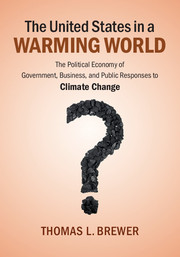 The United States in a Warming World
The United States in a Warming World Book contents
- Frontmatter
- Dedication
- Contents
- List of boxes
- List of figures
- List of tables
- List of maps
- Preface
- Acknowledgments
- Permissions
- Introduction: a chronological overview
- Part I Issues
- Chapter 1 Questions, analytic framework, and context
- Part II Domestic economics and politics
- Part III National government policies
- Part IV The future
- References
- Index
Chapter 1 - Questions, analytic framework, and context
Published online by Cambridge University Press: 05 October 2014
- Frontmatter
- Dedication
- Contents
- List of boxes
- List of figures
- List of tables
- List of maps
- Preface
- Acknowledgments
- Permissions
- Introduction: a chronological overview
- Part I Issues
- Chapter 1 Questions, analytic framework, and context
- Part II Domestic economics and politics
- Part III National government policies
- Part IV The future
- References
- Index
Summary
We live in an era of global warming. That much is certain.
Michael Oppenheimer (2009)We can’t solve problems by using the same kind of thinking we used when we created them.
Albert Einstein (no date)Climate change is not a new issue, and it is not an issue that will go away. It has been widely recognized by scientists as a problem since at least the 1980s. It has received much greater attention in recent years as governments and businesses have begun to address it more tangibly, and as publics around the world have begun to consider more seriously the nature of the problem, its implications, and approaches to trying to solve it. This book addresses questions about what government and business in the USA have done and not done, what the public believes and wants, or does not believe or want. Several of the key questions concern change or the lack of it: Why have business and government in the United States been laggards in their responses to climate change? Other questions concern variations in attitudes and policies among industries and regions about what to do. Yet others concern how and why government policies have been affected by business lobbying. In short, the book covers a wide array of questions about government, business, and public responses to climate change issues in the United States.
- Type
- Chapter
- Information
- The United States in a Warming WorldThe Political Economy of Government, Business, and Public Responses to Climate Change, pp. 15 - 50Publisher: Cambridge University PressPrint publication year: 2014
